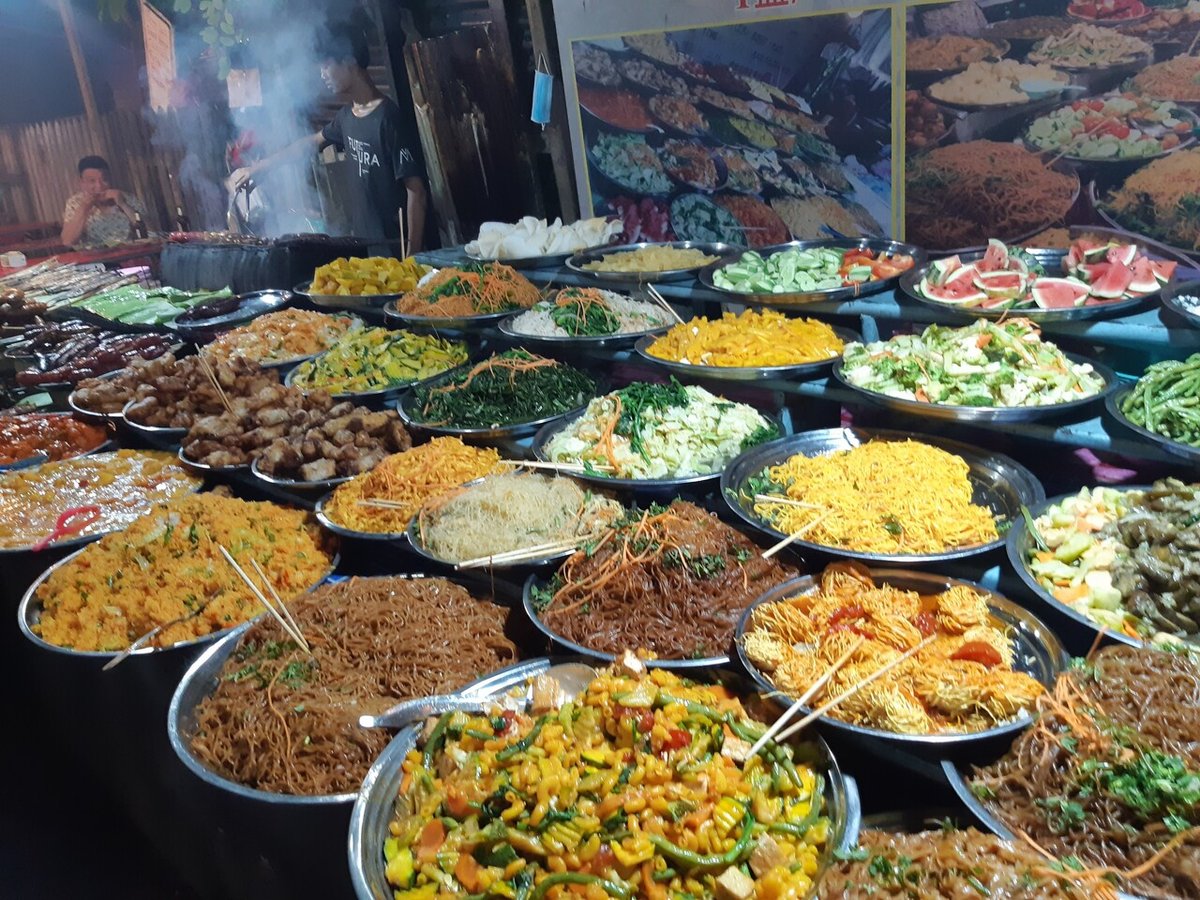
【一人で勝手に旅気分】23
(過去の旅についての振り返りです)
★ラオス・ルアンパバーンの旅2日目(2019年4月18日の夜と19日の早朝)
3年前の4月はまだ新型コロナ感染症の蔓延はなく、ラオスでは例年通り、ラオス正月(ピーマイラオ)で盛り上がっていました。
ラオス正月の前後もお祝い事などが多く、勤務校は休みだったので、ルアンパバーンを堪能できました。1日目の夜は、屋台を回って夕食を調達しました。たくさんの観光客が来るからでしょう、膨大な品数に圧倒されてしまいました。
1PLATE/15000kipと書かれています。数字だけ見るととても高そうに思えますが、ラオスの通貨kip(キープ、キップ)は、1kip=0.010537234円(2022年4月13日現在)です。これではよく分かりませんね。
ラオスは現在、硬貨が使われておらず、紙幣のみの状態で、その紙幣のうち最小の単位として使われるのが1000kip札です(たまに500kip札も見かけますが、500kipから10万kipまでの紙幣を紹介しておきます)。そして1000kip=約10.5円なので、1PLATE/15000kipは、約158円ということになります。
選択肢が多すぎて迷ってしまいましたが、串焼きと炒め物を買って宿泊先に戻りました。
翌朝は早く起きて、大きな通りに出てみると、僧侶の托鉢が行われていました。ルアンパバーンの托鉢はかなり有名で、観光客も僧侶に食べ物やお菓子を喜捨することできます。喜捨用の品物を売っている屋台もたくさんありました。
ルアンパバーンの托鉢はあまりにも有名になったため、観光資源化してしまっているのは少し寂しい気持ちになりました。注意事項なども示されているのですが、托鉢の列の邪魔になる距離感で写真を撮る人もいました。
異文化理解というものは、見世物のように異なる文化に触れることではなく、その文化の意義や伝統といった、昔から積み重ねられ受け継がれてきている雰囲気という目に見えない部分にも敬意を払うものでなければならないと改めて感じました。
ただし、どのような歴史についても敬意を払うべきかというとそうではありません。かつて帝国主義的に支配地域を拡大させていた歴史の復権として、「大ロシア主義」と言えるウクライナへの武力侵攻については敬意の対象にはならないと思います。先日、東京大学の入学式の祝辞で「ロシアを悪者とするのは簡単」という表現が使用されたようですが、確かに、善と悪という二項対立で物事を単純化する思考は安直ですし、「勧善懲悪」というストーリーにシンパシーを抱きやすい国民性が日本にはありがちなので、「どちらが善で、どちらが悪」という枠組みに収めて納得したくなる人も少なくないのかもしれません。祝辞の内容全体を確認していないのでコメントできる立場ではないのですが、「ロシアを悪者とするのは簡単」というのは「ロシアを悪者扱いしてはいけない」という意図ではなく、「善悪の安直で単純な決めつけに走らず精緻に物事を洞察することが大切」といったことを伝えたかったのではないでしょうか。
However, it is not the case that we should respect any history. I don't think the armed invasion of Ukraine, which can be called "Great Russianism," is a subject of respect as a restoration of history that once expanded the territory of imperialism. The other day, it seems that the expression "It's easy to make Russia a bad guy" was used in the congratulatory address of the entrance ceremony of the University of Tokyo, but it is true that the idea of simplifying things with the binary opposition of good and evil is straightforward. However, since Japan tends to have a national character that tends to have sympathy in the story of "poetic justice," there may be many people who want to be convinced by putting it in the framework of "which is good and which is evil." I am not in a position to comment because I have not confirmed the entire content of the congratulatory message, but "it is easy to make Russia a bad guy" does not mean "don't treat Russia as a bad guy", but "good and evil" Perhaps he wanted to convey something like, "It's important to have a precise insight into things, rather than trying to be straightforward and simple."
そこで「罪を憎んで人を憎まず」という言葉を用いて考えてみてはどうでしょうか。それは、どちらが善か悪かではなく、その行為は不法または違法かどうかに注目するということです。今回の場合、先制自衛の形に見て取れる越境の軍事行動が、様々な国際法規に照らして正当性を持つかどうかということになると思います。
So why not use the phrase "hate sin and not hate people"? It's not about which is good or bad, but whether the act is illegal or illegal. In this case, I think it will be whether the cross-border military action that can be seen in the form of preemptive self-defense has legitimacy in the light of various international laws and regulations.
「人を憎んで」しまうと、本来関係のない部分にまで悪影響があります。日本の宿泊施設が、ロシア人とベラルーシ人の宿泊拒否をしたという報道がありましたが、ロシアやベラルーシという国家に対する経済制裁や、政治家などの資産凍結、国家の代表としてスポーツなどの文化交流の中止といった措置は、あくまでも国家との繋がりに基づいて行われる様々な非軍事的措置であって、あらゆる一般人が対象になるものではないと思います(企業活動などになってくると話は違ってくると思いますが)。とにかく単にロシア人だからベラルーシ人だからということであらゆる面で排除の論理が働くのは、安直で単純すぎる思考だと思います。
If you "hate people", it will have an adverse effect on the parts that are not originally related. It was reported that Japanese accommodations refused to accommodate Russians and Belarusians, but economic sanctions against the nations of Russia and Belarus, asset freezes by politicians, and cultural exchanges such as sports as representatives of the nation. I think that measures such as cancellation are various non-military measures that are taken based on the connection with the nation, and are not intended for all ordinary people (unlike when it comes to corporate activities). I think it will come). Anyway, I think it's too straightforward and too simple to think that the logic of exclusion works in every aspect because it's just Russian and Belarusian.
「罪を憎んで人を憎まず」は、「国家の行為で罪と見なしうる部分を憎んで、単にその国出身だからということで人を憎まず」ということだと思います。
I think that "hate sin and not hate people" means "hate the part of a nation that can be regarded as sin and do not hate people simply because they are from that country."
#この街がすき #旅のフォトアルバム
#ラオス #ルアンパバーン
#世界遺産 #屋台 #托鉢
#ウクライナ情勢 #ukraine
#peace_for_Ukraine #stand_with_ukraine
#東京大学入学式 #勧善懲悪 #二項対立









